A local favourite, Confetaria 31 January has garnered attention from tourists drawn in by its Goan-Portuguese cultural heritage of 94 years. Annoushka Fernandes of The Goan discovers the rich tapestry of traditional recipes and heritage preserved within its walls

In the serene lanes of Fontainhas lies 'Confeitaria 31 de Janeiro', a postcard-worthy café that has captured the hearts of locals and tourists alike. Now 94 years later it is run by Gletta Mascarenhas, who tirelessly shuttles between the counter and the bakery inside to ensure every customer is taken care of and orders are handled seamlessly.
Legacy of tradition
Established in 1930 by Andre Mascarenhas, the bakery originally focused on traditional Goan breads such as poi, pao and other local varieties. “Around a decade later, we started making Swiss rolls, the plum cakes,” shares Gletta reflecting on the bakery’s storied past. Remarkably, it was 31 de Janeiro that introduced the first slice bread to Goa
New generation takes over
Having completed 27 years at the helm, Gletta is an IHM graduate trained at a 5-star hotel. She married into the Mascarenhas family and took over the bakery. “I never met Andre Mascarenhas but he left the family recipe book and we had staff who had been with us for four decades. That’s how we maintained the traditional Goan-Portuguese essence of the bakery,” she shares.
Commitment to tradition
What sets Confeitaria 31 de Janeiro apart from other bakeries in Panaji is Mascarenhas’ commitment to homemade, preservative-free products baked in a traditional wood-fired oven. "All our products are made in a homemade style, with no preservatives at all," Gletta emphasises. Among the bakery's offerings are traditional Goan-Portuguese sweets like Pasteis de Nata, Serradura, Bebinca, and Pinagr. "We preserve the authenticity of dishes by sourcing raw materials from Mapusa and the Goan-style jaggery from Morjim."
Popularity through social media
Although quite popular among the locals, Gletta credits social media for playing a big role in the bakery’s popularity in recent years. “People staying abroad come here after seeing videos online. I was shocked by the love. We recently renovated and temporarily shifted to our neighbour’s place, and people would ask when we were reopening. It’s a proud feeling that the bakery is on people’s bucket list,” she states with a warm smile.
Overcoming challenges
However, running the bakery comes with its challenges and demands. “Staffing issues are a big challenge,” Gletta confides. “Now we have a team from outside. It’s not an easy job running this place; it’s tough since the work begins very early in the morning.” Balancing traditional food with contemporary tastes is also tricky. “We cater to non-meat eaters and those who don’t consume eggs, but the traditional recipes always had eggs. We maintain a variety for these preferences, but it’s a bare minimum."
Family support plays a crucial role in the bakery’s success. “My son helps me build this place up, and my daughter comes here after school to help,” Gletta shares.
Modern additions
Recently, they introduced new items like pizzas and pastas, inspired by tourist requests. “Tourists who love our food requested heavier meals in the evening, hence inspired by them these items were added to the menu. Our pizzas are made in the wood-fired oven, keeping with our traditional methods," says Gletta.
Deep roots in tradition
Despite these modern additions, the bakery remains deeply connected to its Goan-Portuguese roots. "We’ve stuck to the old recipes and haven’t changed anything drastically," Gletta notes. "We’ve introduced contemporary items, but they’re a smaller part of our offerings. Our focus remains on Portuguese-influenced culture and Goan tradition."
For Gletta, running Confeitaria 31 de Janeiro is more than a job—it’s a passion. "The most I enjoy about running this place is that it’s not work for me but a hobby. If I don’t come here, I get restless," she concludes.